On The Record with Eugene Prokhin, Head Coach for Y Pro Water Polo
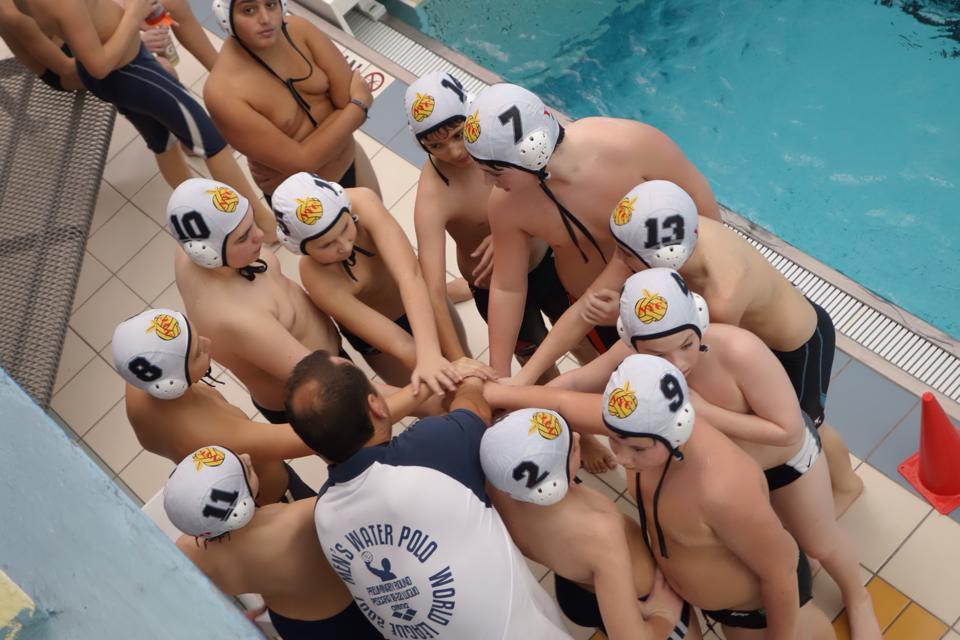
By Michael Randazzo, Swimming World Contributor
BROOKLYN, NY. Recent growth of water polo in New York City’s most populous borough has been fueled by an influx of accomplished age group coaches who have experience with polo at the highest levels. Zoli Danko, who leads Mako Polo, hails from Hungary, where he played before joining St. Francis Brooklyn’s intercollegiate team. Bela Rex-Kiss and Andrei Draghici at the Brooklyn Water Polo Club played professionally—Rex-Kiss won a Hungarian League title with Vasas SC, while Draghici played for Romania’s Rapid Bucuresti and Sportul Studentesc.
But none of these coaches can match the pedigree of Y Pro Waterpolo’s Eugene Prokhin. Born in the Soviet Union prior to the 1991 break-up of the USSR, Prokhin achieved success with his native Kazakhstan national team, representing his country in the 2000 Olympics. Arriving in America a few years later, he was part of a Queens College team that finished third at the 2002 NCAA Men’s Water Polo Tournament.
Taking his swim and polo experience to the Kings Bay Y in Sheepshead Bay, conveniently located in an oasis of immigrants to the U.S. from the former Soviet Republics, Prokhin proceeded to join forces with Roman Agabs, a former professional player from Azerbaijan and Irakli Sanadze, a polo player and referee from Georgia. The result is one of the most competitive clubs in the Northeast, one that over 12 years has demonized opponents, due to the skill and drive that Y Pro’s 12U, 14U and 16U players bring to the pool.
Prokhin spoke with Swimming World between 12U matches at Chelsea Piers, CT, part of competition for the Tri-State League, the region’s highest level of competition.
– You’ve had a long and distinguished connection with water polo.
I was born in the Soviet Union and began playing water polo when I was nine years old. I was like a regular kid, just playing, but when I turned 11 I decided I wanted to play for the Soviet Union national team and become an Olympian. I worked hard and when I turned 14 I played for the USSR junior national team.
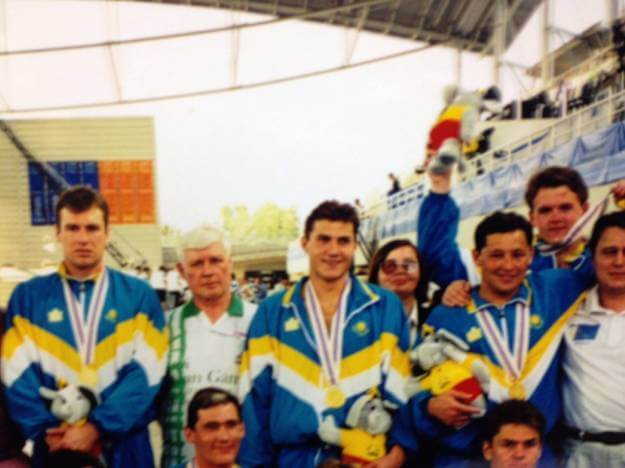
Prokhin (center) at the 1994 Asia Games Photo Courtesy: E. Prokhin
I played for a couple of more years and then Soviet Union disappeared. I stayed in Kazakhstan and played for the national team. We were the champions of Asia in 1998 and 2002.
– …And represented Kazakhstan in the 2000 Olympics.
I played in 2000 in Sydney. What I remember from 2000 is referee issues. We won a couple of tournaments with Spain, Italy and Germany before the Olympic games. We played against Russia and Spain in our group and also Australia.
In the Australia game, if we win we are going to the first [six]; if we lost we’re going to the second [six]. When we played against Australia, we get five penalties, and the rate of the exclusion was 16 to 4 against us. We lost [by] one goal [actually, it was an 11-all tie; Australia advanced to the medal round with one more point that Kazakhstan].
We finished ninth and that’s it. After the Olympic games [in 2002] I made the decision to study in the U.S. at Queens College.
– How did you pick Queens College in New York City?
I had a friend who came a few years earlier. He called and asked if I would like to go and play—I said: “Yes!” That year we won Eastern Championships; we played against Navy and beat them [5-4]. We went to the Final Four where we finished third. This was a good result for our coast.
– How was it to go from playing in the Olympics against some of the world’s best players to being in the NCAA men’s tournament against America’s best college players?
It was much younger players, so it’s a time when you have to lead the team and win the game. This is hard because you have to teach everyone exactly what they are supposed to do to win the game. We had very good players—me and Misha Klochkov, Vedran Sokac, Michel Vieira and Istvan Baloga. We worked for the team and the team worked for us.
Mark Lawrence [now the head coach for Austin College] was on the team. He was the hole set.
– You decided to stay in New York City and found a career managing youth swim instruction.
In 2007 I made the decision to open my club—but finding a swimming pool to open the club was very hard. Finally, I got the pool and I began two days per week, one hour each practice. We’ve grown so now we have practice five days a week—an hour and a half—and I became aquatics director [at the Kings Bay Y] and building manager because we have four locations. That’s my fulltime job and my hobby at the same time.
– There were others who helped you get Y Pro off the ground.
I gave advertisement to the newspaper, and then kids began to come. Roman Agabs came with his son Joseph—I think at nine years old. [Roman] played in a high-level Russian water polo club [KKF one of the premier Soviet water polo clubs, and the top club in Azerbaijan.].
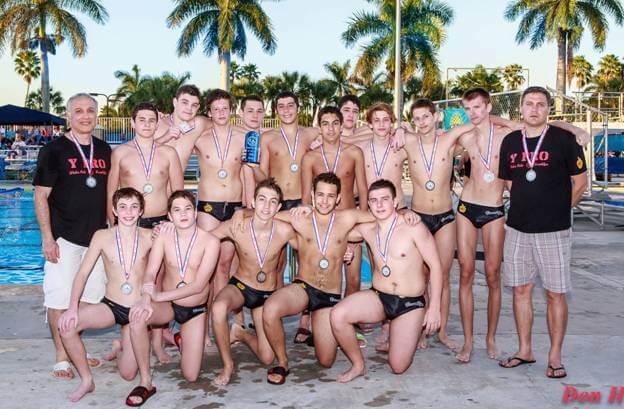
Y PRO 16U at the South Florida International Water Polo Tournament (Prokhin right, Roman Agabs left). Photo Courtesy: E. Prokhin
We worked together for almost six years. Our first year was kids who were born in 1998 and 1999.
Right now there are two kids playing for St. Francis; one is Alex Teplitsky, the other is my son, Nikita. One is at Fordham—Joseph Agabs.
– There’s very few athletes from New York City playing at DI or even DIII schools. How was Y Pro able to prepare these athletes?
All colleges look at the best players. To be the best takes hard work. That’s why we only have a few who would work hard—they were high-level players, which is why they got scholarships.
It depends on the parents. Usually the kids when they pick the college they look at the kind of scholarship for a particular sport. I know that Alex didn’t get a scholarship; he’s playing because he wants to. That’s a good sign that we taught him something to do well.
Joseph and Alex are playing and they’re playing well.
– What values does your club able to instill in these kids to make them successful?
I grew up in Russia where they have different coaching; you have to work hard at every practice and they’re pushing you—that’s the way players grow up. That’s the same way I’m working with the kids. When they come to the practice the first thing is discipline; they are supposed to follow my direction. If they need additional help they can always stay after the practice and I will work with them.
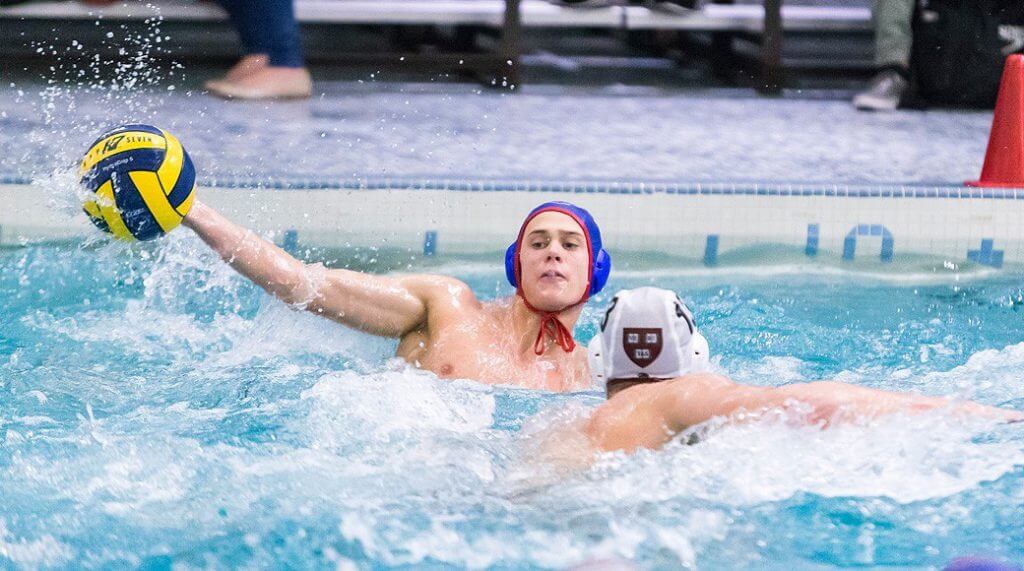
Nikita Prohkin playing for the Terriers. Photo Courtesy: St. Francis Brooklyn
My point [is] if they’re playing well they can get a scholarship to [select] colleges from all around the country. But they must work hard. And it doesn’t matter if you’re a good player or not, you must work together.
Also, the most important part is to get the parents involved; they’re supposed to bring their children to competitions. Without competition [there’s] no team. They can’t just come and play for fun.
For example Irakli [Sanadze] who has worked with me from 2012, his team, the parents don’t bring the kids to competition. They play until high school, and then the team disappears because some want to play but [others] don’t come to practice. Irakli has a new team for kids born 2008-2009. We’ll start again to get those kids up to water polo level.
– Your younger son Max is playing now for Y Pro—and following in your son Nikita’s footsteps.
Max began coming to practice when he was seven—starting with passing and shooting. When we opened the team for 2006-2007, he leads the team right now and is working hard. For me being a father and a coach is difficult. I argue with my son—he disagrees with me—which is very hard because the other players are watching.
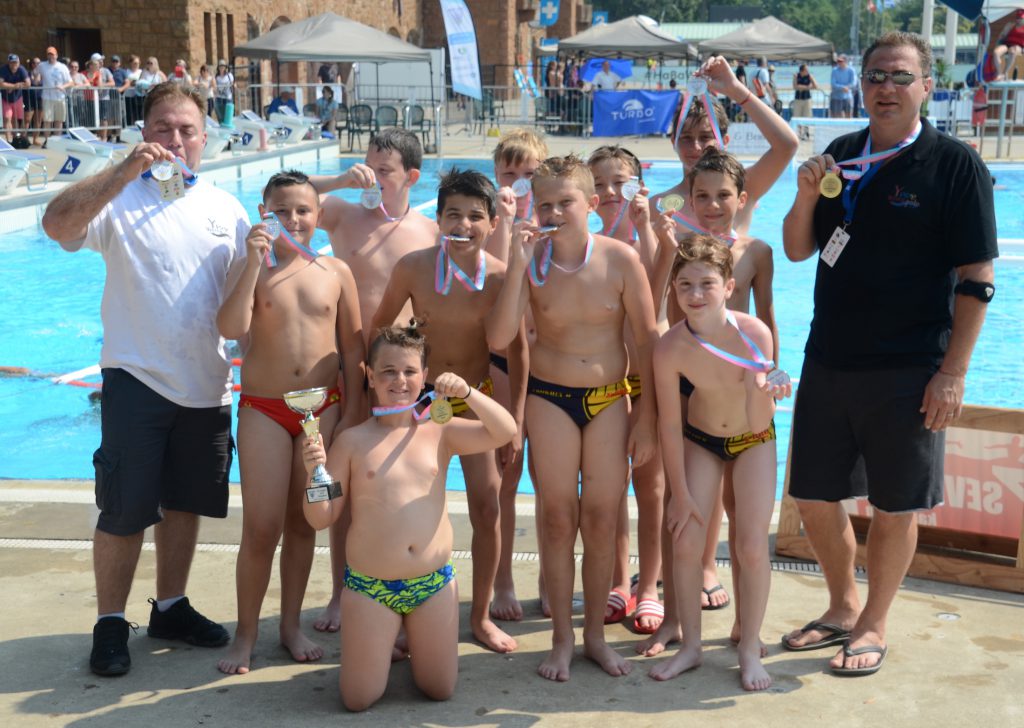
Y Pro 11U winners at 2017 HaBa WaBa Tournament. Photo Courtesy: ZINGSHOTPHOTO
Right now we have a rule for everyone: nobody can question me during the practice. After the practice I can sit down and explain to them—especially for my son. Sometime Nikita helps with the practice and when we come home it’s a huge issue because he does something wrong, etc.
But Max is working hard, and I hope he will not stop and get a scholarship at a good college.
– Max’s team has already had success, including a title at HaBa WaBa when they were younger.
In 2017 we went to HaBa WaBa and won [5-4 over Shadow]. The tournament was [ages] 11 and under—we signed up when all kids were 10 years old. This year we went to HaBa WaBa and lost to team that brought older kids to [a] 12U match and let them play. We finished fifth.
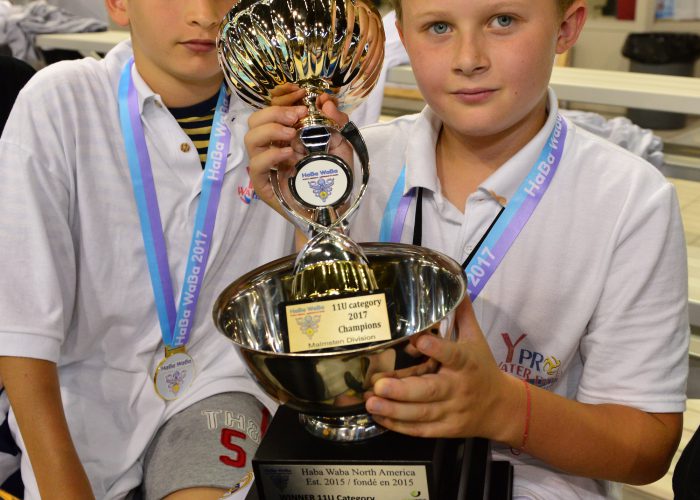
Max Prokhin sporting HaBa WaBa hardware. Photo Courtesy: ZINGSHOTPHOTO
For my team I teach them always: you come to win. That’s why we spent time coming here. Any tournament; it doesn’t matter.
Sometimes we win and they’re very happy and very excited and they want to go forward. Sometimes they lose the tournaments and they’re upset. I have to teach them what mistakes they made [so they improve].
– The major challenge in New York City is access to deep water pools. You’re fortunate enough to have a swim facility that you can book as you need but that’s likely not enough to keep your players progressing.
When we began the club it was two days per week. Because I work for the Kings Bay Y Jewish Community Center. I went to them and said: Listen, we have to build the best learn-to-swim program. Before I came to Kings Bay I worked many different swim programs like Asphalt Green, 92nd Street Y and other pools. I know what their programs do.
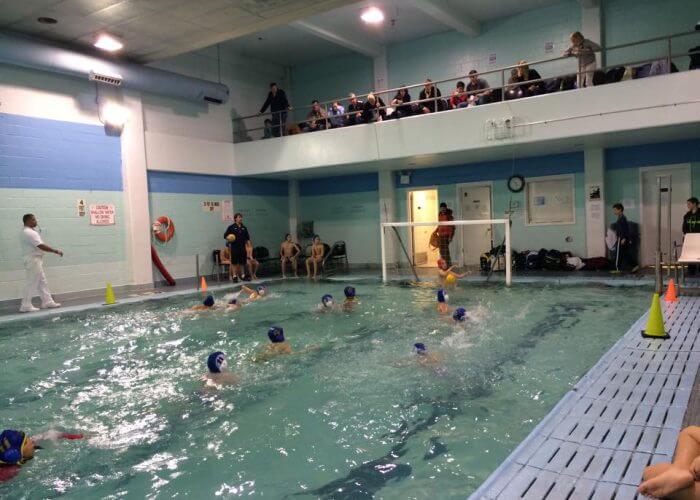
Kings Bay Y pool. Photo Courtesy: Irakli Sanadze
When I got to Kings Bay they had 50 kids for the semester. Right now we have 500 kids per three-month semester—and we run four seasons, fall, winter, spring summer. I built this as a learn-to-swim program but I made time for water polo.
Kings Bay Y is making money from swim program and we’re happy we have a water polo team with pool time. Also, four years ago, one of our parents helped us get Brooklyn College to rent their swimming pool. We practiced there for three years—and then they [doubled] the rent. Unfortunately we cannot afford this.
– Given your experience with the sport, what is the outlook for polo in the Big Apple?
Asphalt Green, for example, they have a huge pool. Definitely that have time for water polo. But this is a kind of competition because they have a very good swim team, and they don’t let water polo get more water. That’s typical with swimming pools here.
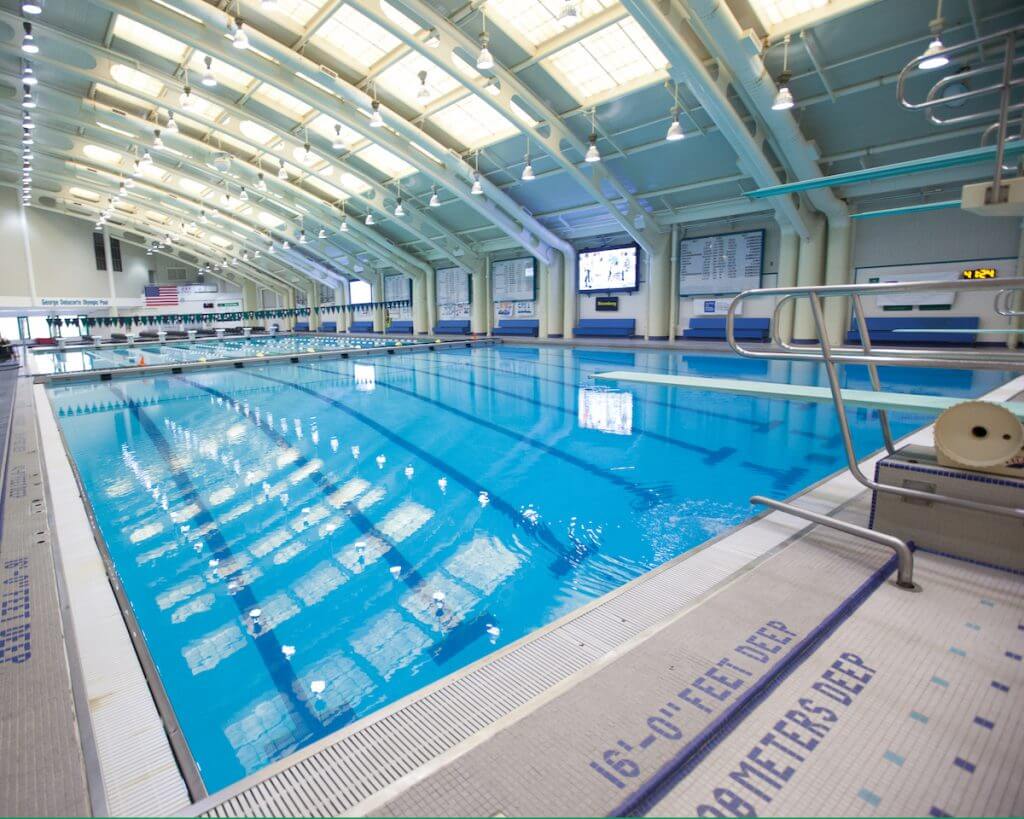
Asphalt Green pool. Photo Courtesy: Poby/Asphalt Green
Other pools [in New York City] they have swim teams and they don’t let water polo practice. For the future, the water polo community is growing up in New York City. Before, when I was beginning there was my club. Now we have four. That’s a good sign for the future.
– USA Water Polo oversees the sport nationally. What more can they do in New York City to foster the sport’s growth?
They can bring international competition to our coast—which they did one time maybe 12 years ago when they played World Cup on Long Island. That’s it. Nothing else. The younger kids need something to follow, and so professionals [can inspire] them. maybe once every two years. That will be great for everyone.



